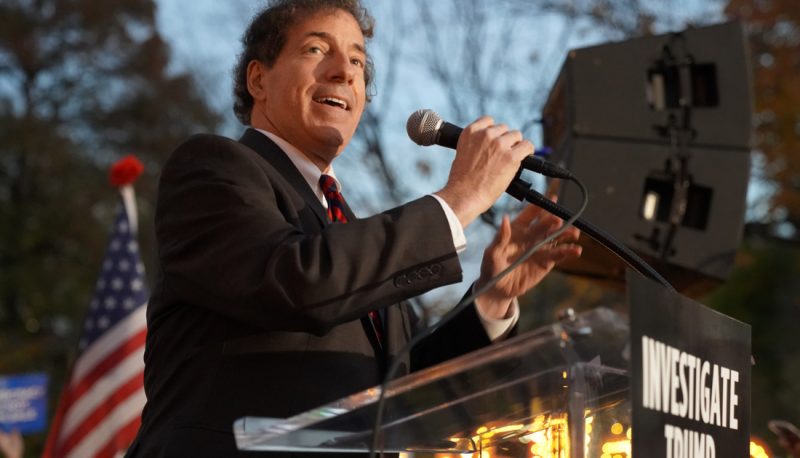Ten years ago, the Supreme Court ruling in Citizens United unleashed a flood of corporate money into American politics, giving corporations and wealthy donors free rein to influence our elections. On February 6, 2020, the Democracy for All Amendment, a proposed constitutional amendment that would change campaign finance laws and limit the amount of money that can be used to influence elections, will have a public hearing for the first time in the 116th Congress. Learn about the history of Citizens United, previous attempts at passing a constitutional amendment, and other effects of the 2010 ruling by exploring the resources below, all contributed over the years by Rep. Jamie Raskin (Md. 8), a former senior fellow at People For the American Way.
The Supreme Court in the Citizens United Era
The only effect of Citizens United was to give CEOs of business corporations the power to take unlimited amounts of money from corporate treasuries and spend it advancing or defeating political candidates of their choosing. Its real-world consequence was thus not to expand the political freedom of citizens but to reduce the political power of citizens vis-à-vis huge corporations with vast fortunes. These corporations, endowed with limited shareholder liability, perpetual life, and other privileges, may now freely engage in motivated political spending to enrich themselves and their executives, leaving workers and other citizens behind.
Read more here.
PFAW Member Telebriefing: Preview of Upcoming PFAW Foundation Report, The Supreme Court in the Citizens United Era
On March 25, 2015, PFAW Foundation Senior Fellow Jamie Raskin previewed his upcoming report, The Supreme Court in the Citizens United Era, during a member telebriefing. Executive Vice President Marge Baker and Senior Legislative Counsel Paul Gordon also joined the call to answer questions from members and discuss PFAW efforts to promote fair and just courts. Drew Courtney, former director of communications for PFAW, moderated.
Read more here.
Answers of Professor Jamie Raskin to Questions for the Record from Senator Richard J. Durbin: Senate Judiciary Committee Hearing on “Examining a Constitutional Amendment to Restore Democracy to the American People”
The [proposed] 28th Amendment would reaffirm and restore congressional and state power to regulate campaign finance, but nothing in it could interfere in any way with the First Amendment doctrines of viewpoint and content neutrality as they would apply to such regulations. The 28th Amendment would, for example, empower Congress to restore the aggregate candidate contribution limits that had been in place under FECA for decades and were just invalidated by the Supreme Court in the 5-4 McCutcheon decision.
Read more here.
Answers of Professor Jamie Raskin to Questions for the Record from Senator Grassley: Senate Judiciary Committee Hearing on “Examining a Constitutional Amendment to Restore Democracy to the American People”
Thus, if the justification being offered for Citizens United is to “allow individual citizens to associate and combine resources in the corporate for to participate more effectively in the political process,” as the question posits, then this justification is hollow and specious because all Americans already had that right. Without a rationale for the decision that explains specifically why the managers of for-profit business corporations must have the power to spend corporate treasury resources on political campaigning–the power, that is, to convert economic wealth amassed in business by a corporation into political finance capital–we are left with the implication that five justices on the Court overturned multiple constitutional precedents […] and struck down dozens of federal and state laws, all simply in order to increase the political power of corporate executives and the candidates they may choose to fund.
Read more here.
Testimony of Professor Jamie B. Raskin Before the United States Senate Judiciary Committee: “Examining a Constitutional Amendment to Restore Democracy to the American People”
Four years ago, in Citizens United v. FEC, the Roberts Court majority bulldozed an essential block of the wall, the one that kept trillions of dollars in corporate treasury wealth from flowing into federal campaigns. In Arizona Free Enterprise Club’s Freedom Club PAC v. Bennett (2011), the Court stifled public debate and destroyed vast new opportunities for political speech by striking down public financing programs that use matching funds to amplify the voices of less affluent candidates competing to be heard over the roar of big wealth. In McCutcheon v. FEC (2014), the Court took a sledgehammer to the aggregate contribution limits, empowering political tycoons and shrewd business investors to max out to every Member of Congress and all their opponents. All of these assaults on political equality and free speech were justified in the name of the First Amendment.
Read more here.
The Gospel of Citizens United: In Hobby Lobby, Corporations Pray for the Right to Deny Workers Contraception
If right-wing America had set out to design a Supreme Court case that combined all of its political fetishes, it could not have done better than to come up with Hobby Lobby Stores Inc. v. Sebelius, a devilishly complex assault on Obamacare, women’s health care rights in the workplace, and the embattled idea that the Bill of Rights is for people, not corporations. The outlandish claims of the company involved would not have a prayer except for Citizens United, the miracle gift of 2010 that just keeps giving.
Read more here.
Edit Memo: Take Back the Constitution from the Corporate Court
Now, in the bitterly divided Citizens United decision (2010), five Justices on the Roberts Court have held that corporations have the right to spend unlimited sums of money promoting or disparaging political candidates. This decision – built on the dangerous fallacy that state-chartered corporations enjoy the same political free speech rights as the people – strikes another dangerous blow against popular democracy. It is a blueprint for government of the big corporations, by the big corporations and for the big corporations.
Read more here.
